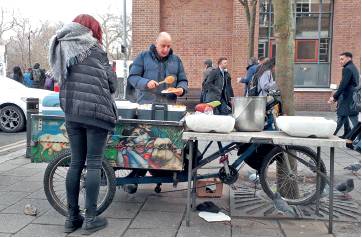Akshaya Patra Foundation
This is a collection of articles archived for the excellence of their content. |
2018
1st kitchen in London
Naomi Canton, London’s poor get a taste of Indian charity, March 14, 2018: The Times of India

From: Naomi Canton, London’s poor get a taste of Indian charity, March 14, 2018: The Times of India
Akshaya Patra’s first kitchen in London serves 2,000 vegetarian meals to poor students and the homeless
At Kentish Town in northwest London, around 40 poor men queue up for a paper plate of steaming vegetable stew and rice. “It’s a life-saver in this freezing cold,” explains Andrew Moran, 53, one of the group. “A lot of people would starve otherwise.”
No one is aware an Indian charity is funding their meal.
For the past two years, Akshaya Patra Foundation UK/Europe focus has been on fundraising to help pay for 1.6 million midday meals for schoolchildren in India. But the Indian charity has now turned its attention to the poor in Britain.
It has opened its first kitchen in London and started serving 2,000 nutritious vegetarian meals per day for free to students and the homeless. Next, it will expand to schoolchildren, the elderly and hospital patients. Half a million children go to school hungry in the UK, 70,000 of whom live in London.
A 2,000-sqft makeshift kitchen has been carved out of the basement of a building in Holborn where members of the UK charity Food for All make vegetable stew, pasta, and superfood porridge. Akshaya Patra has teamed up with the charity to cook and distribute the food in vans and by rickshaws to three feeding points in London for homeless people, and to SOAS (School of Oriental and African Studies) and LSE (London School of Economics) for poor students.
“Food for All had the manufacturing licences and experience. We will scale it up and make it more organised,” says CEO Bhawani Singh Shekhawat. The philosophy is the same as that used to create mid-day meals but recipes are suited to the local palate. “We don’t offer sambar but it is still ayurvedic, protein-balanced food with no additives and we don’t reheat,” he adds.
Last summer, as a pilot the charity offered meals to 100 schoolchildren at a holiday club at Newham Catholic College. In the UK three million children go hungry during the holidays. “There are families of six living on a food budget of £80 a month who cannot afford to feed their children. Many working parents send their children to these holiday clubs with a bag of crisps. The last meal they had was at 6pm the night before. It is the responsibility of the state but there is a lack of funding,” says Shekhawat.
At the kitchen, Parasuram Das, who founded Food For All and is the head of manufacturing at the Akshaya Patra UK project, is delighted. He had emailed Goldman Sachs the day before, introducing himself as a new bank next door to theirs — except his was a “food bank.” “The next morning they were down here seeing how they could help,” he says. As we speak someone from a building company working on the construction of Goldman Sachs’ new London offices arrives and offers to pay for all the paper plates worth £250 a week and a £35 sack of dal a day.
Das goes around supermarkets each evening collecting wonky vegetables, short-dated products and supermarket surplus which he uses to make dishes. He also receives donations from wholesalers who supply Indian supermarkets in the UK.
The first feeding point is in Kentish Town. Among the waiting group is a retired painter Thomas, 66, who survives on a state pension of £135 per week. “After bills there is not enough money left for food,” he says.
Next we head to SOAS where there is a queue of 50 students. Polish Olga Iskra, 23, says: “I come here most days as I am on a really low budget.” Fellow student, Anthony Krowicki, 22 adds: “The quality of food is amazing and the university canteen is bad and expensive.”
At King’s Cross, a crowd of homeless men is waiting. One man in a black anorak, who has been sleeping rough for 20 years, says: “The food is excellent, they don’t pester me for money and I like the concept of communal eating. This is my only meal of the day.”
Shekhawat says they have already been approached by organisations in Spain and Italy. “They are saying to us, ‘You think it’s just an Indian problem?’ Inequality is a global problem so to classify countries as rich or poor is increasingly irrelevant and far too broad a generalisation.”